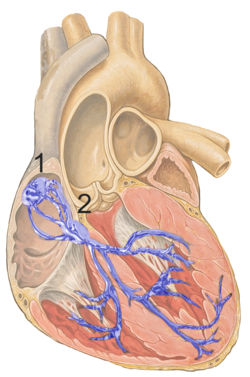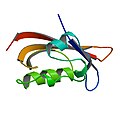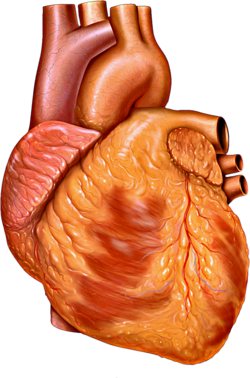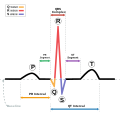Unlike the action potential in skeletal muscle cells, the cardiac action potential is not initiated by nervous activity. Instead, it arises from a group...
46 KB (5,463 words) - 05:17, 25 July 2025
action potentials, such as the cardiac action potential and the action potential in the single-cell alga Acetabularia, respectively. Although action potentials...
149 KB (16,456 words) - 03:48, 15 July 2025
Lakatta, Edward G. (2015). "Potential effects of intrinsic heart pacemaker cell mechanisms on dysrhythmic cardiac action potential firing". Frontiers in Physiology...
2 KB (217 words) - 01:18, 19 June 2025
membrane potentials. As the membrane voltage begins to drop the channels recover from inactivation and carry current. Cardiac action potential Grant, Augustus...
3 KB (400 words) - 22:37, 25 May 2025
upstroke of the cardiac action potential there is a large influx of Na+ ions. This depolarizes the cell and shifts the membrane potential in the positive...
20 KB (2,223 words) - 06:03, 28 May 2025
cardiomyocytes known as pacemaker cells that can spontaneously generate cardiac action potentials. These signals are propagated through the heart's electrical conduction...
11 KB (1,405 words) - 15:13, 31 May 2025
repolarization peak. Cardiac action potential Vigmond E.J, Tsoi V, Yin Y, Page P, & Vinet A. (2009). Estimating Atrial Action Potential Duration from Electrograms...
991 bytes (119 words) - 05:52, 22 August 2022
Sinoatrial node (category Cardiac anatomy)
vena cava. These cells produce an electrical impulse known as a cardiac action potential that travels through the electrical conduction system of the heart...
24 KB (2,810 words) - 13:10, 16 July 2025
important differences. Electrical stimulation in the form of a cardiac action potential triggers the release of calcium from the cell's internal calcium...
42 KB (5,073 words) - 03:27, 16 June 2025
Antiarrhythmic agent (redirect from Cardiac dysrhythmia medications)
multiple modes of action, which makes any classification imprecise. The cardiac myocyte has two general types of action potentials: conduction system...
21 KB (1,997 words) - 21:23, 15 July 2025
systole). Apex beat Cardiac action potential Cardiac output Pulse Pollock JD, Makaryus AN (3 October 2022). "Physiology: Cardiac cycle". StatPearls Publishing...
20 KB (1,873 words) - 14:26, 2 June 2025
Flecainide (section Mechanism of action)
the entry of sodium in heart cells, causing prolongation of the cardiac action potential. Flecainide was approved for medical use in the United States in...
23 KB (2,334 words) - 03:34, 19 July 2025
current. Pacemaker action potential Graded potential Wei, Xingyu; Yohannan, Sandesh; Richards, John R. (2025). "Physiology, Cardiac Repolarization Dispersion...
9 KB (1,167 words) - 23:37, 23 March 2025
the hERG channel mediates the repolarizing IKr current in the cardiac action potential, which helps coordinate the heart's beating. When this channel's...
20 KB (2,348 words) - 06:01, 19 July 2025
SCN5A (redirect from Cardiac sodium channel)
phase of the cardiac action potential. As such, it plays a major role in impulse propagation through the heart. A vast number of cardiac diseases is associated...
25 KB (2,761 words) - 18:34, 16 July 2025
each ventricular systole. Cardiac muscle tissue has autorhythmicity, the unique ability to initiate a cardiac action potential at a fixed rate – spreading...
47 KB (5,787 words) - 15:46, 21 August 2024
antiarrhythmics. MSA agents produced by beta-blockers reduce the increase of cardiac action potential, while also leading to other electrophysiological effects. However...
1 KB (178 words) - 01:40, 19 July 2023
KvLQT1 (category Cardiac electrophysiology)
contributes to the repolarization of the cell, terminating the cardiac action potential and thereby the heart's contraction. It is a member of the KCNQ...
12 KB (1,503 words) - 17:08, 17 July 2025
Purkinje fibers (redirect from Cardiac Purkinje cell)
cardiomyocytes with fewer myofibrils and many mitochondria. They conduct cardiac action potentials more quickly and efficiently than any of the other cells in the...
8 KB (844 words) - 17:06, 26 May 2025
Bradycardia (redirect from Cardiac arrhythmia/bradycardia)
steady heartbeat. At the beginning of the cardiac cycle, the SA node generates an electrical action potential that spreads across the right and left atria...
40 KB (4,500 words) - 17:40, 17 July 2025
Afterdepolarization (category Cardiac electrophysiology)
abnormal depolarizations of cardiac myocytes that interrupt phase 2, phase 3, or phase 4 of the cardiac action potential in the electrical conduction...
5 KB (546 words) - 01:14, 29 December 2023
Short QT syndrome (category Cardiac arrhythmia)
caused by mutations in genes encoding ion channels that shorten the cardiac action potential, and appears to be inherited in an autosomal dominant pattern....
24 KB (2,532 words) - 07:17, 19 July 2025
Refractory period (physiology) (redirect from Refractory period (cardiac))
change in voltage is referred to as an action potential. Unlike that in nerve cells, the cardiac action potential duration is closer to 100 ms (with variations...
11 KB (1,304 words) - 15:00, 18 July 2025
propagates through cardiac muscle very rapidly. Cells of the ventricles contract nearly simultaneously. The action potentials of cardiac muscle are unusually...
16 KB (1,847 words) - 15:14, 31 May 2025
Fluoxetine (category Articles containing potentially dated statements from December 2016)
specifically the potassium currents Ito and IKs that repolarise the cardiac action potential. Under certain circumstances, this can lead to prolongation of...
119 KB (11,858 words) - 08:48, 18 July 2025
Sodium channel blocker (category Articles containing potentially dated statements from March 2020)
grouped by their effect on the Na+ channel, and by their effect on cardiac action potentials. Class I agents are called Membrane Stabilizing Agents. 'Stabilizing'...
11 KB (1,223 words) - 00:46, 28 April 2025
Amiodarone (section Cardiac arrest)
involved in cardiac repolarization during phase 3 of the action potential, so that this blockade prolongs the duration of cardiac action potentials, resulting...
74 KB (7,670 words) - 12:17, 28 July 2025
T wave (category Cardiac electrophysiology)
sustained contractions because it forces the refractory period and cardiac action potential firing to be of the same length of time. Repolarization depends...
15 KB (1,778 words) - 16:50, 19 July 2025
PDE3 inhibitor (section Cardiac)
cardiac calcium channels. An increased calcium influx from the sarcoplasmic reticulum (SR) during phase 2 (the plateau phase) of the cardiac action potential...
11 KB (1,218 words) - 16:32, 19 October 2024




















